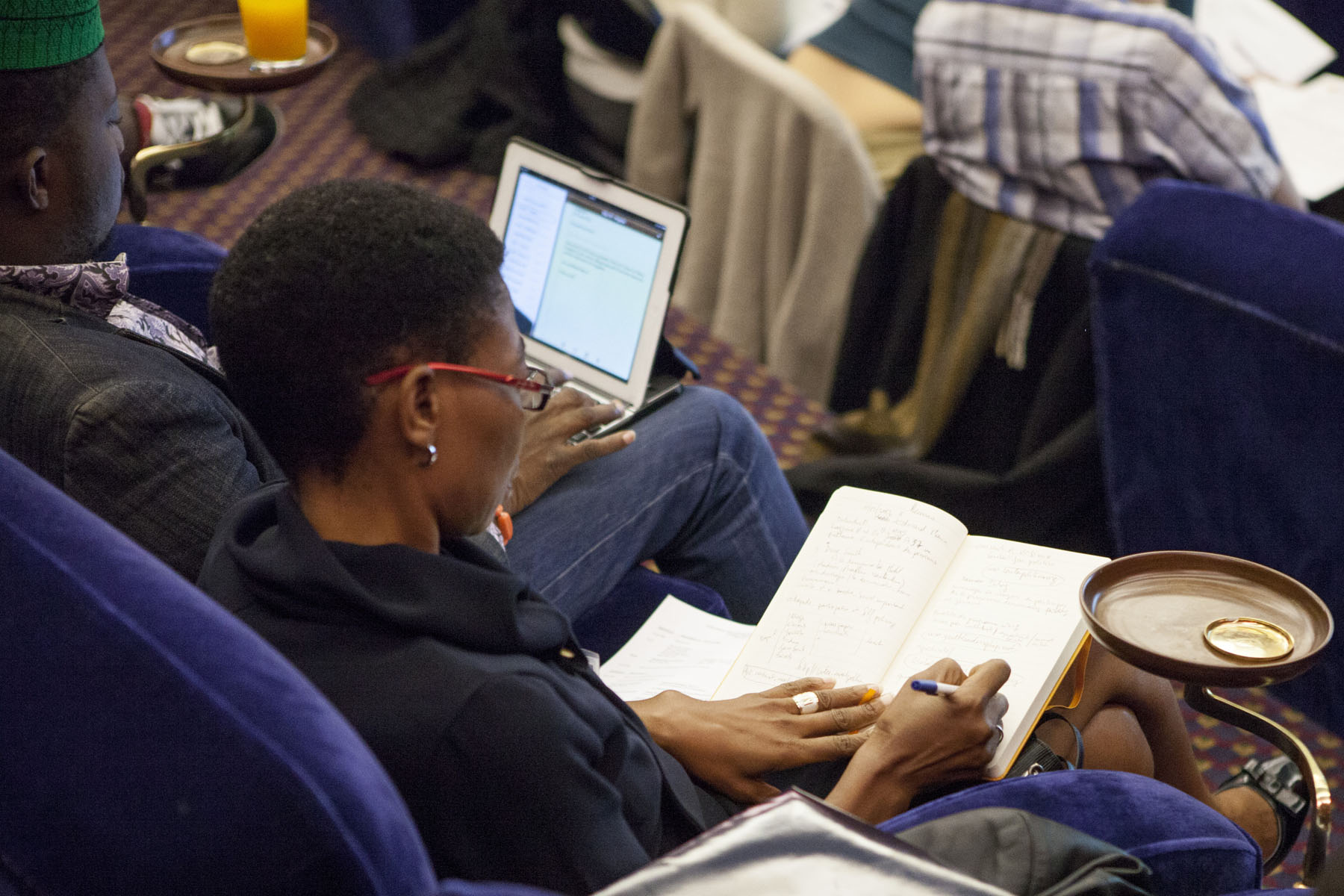Emerging leaders from 25 nations around the world discussed democracy and civil society at the University of Virginia, U.Va.’s Morven Farm, Thomas Jefferson’s Monticello and James Madison’s Montpelier on Tuesday and Wednesday as part of a U.S. State Department exchange program.
Those four hosts are part of a new Presidential Precinct alliance that unites the homes of the three Founding Fathers of Central Virginia – Thomas Jefferson, James Madison and James Monroe – with William & Mary and U.Va., to create a forum for global conversation about how to sustain democracy.
Walking and talking in the shadows of Jefferson, Madison and Monroe gave the emerging leaders some new ideas to take home, explained one of the leaders, Temidayo Israel-Abdulai, a youth activist representing Nigeria.
“We are passionate about development and we want to see our countries change,” he said. “Governments come and go, but civil society continues,” so the group spent time considering how civil society is a cornerstone of democracy.
The participants were nominated by U.S. embassies around the world. Upon their return home, they will serve as representatives of new civil society working groups that are being established as part of Secretary of State Hillary Clinton's “Strategic Dialogue with Civil Society” program.
The State Department group had already visited other places in America, including Kansas, where Israel-Abdulai observed a non-profit food bank making an impact alleviating hunger and childhood poverty. “We want civil society to play a similar role in Africa,” he said. “We’ve got to help government truly meet the needs of the people.”
“Democracy and civil society are always projects in motion, in flux,” said Jeffrey Legro, vice provost for global affairs at U.Va., as he welcomed the group to Morven on Tuesday morning. They spent most of the day there with professors and leaders from all the Presidential Precinct partners.
“Why in the world do you want to review the 2012 U.S. presidential election if your topic is civil society?” Larry Sabato, director of U.Va.’s Center for Politics, joked as he began presenting an overview of American politics and the lessons of the 2012 election. “It certainly wasn’t civil. And I’ve got the websites and emails and TV ads to prove it.”
America’s First Amendment so fully protects free speech that American elections are “freewheeling” affairs full of vitriol, slander and robust debate on seemingly “out of bounds” topics, he said.
“You go with the flow,” he said. “And you hope that in the end people have the good sense to accept proper information and reject information that’s unsupported.”
One visiting leader observed that from outside America, the ideas – even the speeches -- of both Obama and Romney were hard to tell apart.
In the final few weeks of the campaign, the candidates were united in their opposition to Hurricane Sandy, Sabato joked in response. While their speeches may have sounded similar, there are substantial differences between the two parties, and their platforms have grown farther apart in recent years, he said. Studies have shown that the parties do actually work to implement the planks of their platform, so party ideas and elections “do matter,” he said.
Afterward, the delegates were divided for small group discussions on challenges to democracy in the 21st century. In one of the small groups, conversation turned to how best to build the capacity of non-governmental organizations, which are the heart of civil society in many emerging democracies, said Bob Gibson, executive director of U.Va.’s Sorensen Institute for Political Leadership, who helped facilitate the discussion.
In Nigeria, more and more NGOs are establishing profit-making social enterprises so the organization can be financially self-reliant, instead of dependent on foreign aid or other external funding sources, Israel-Abdulai said. The group’s other visiting leaders from Zambia, Samoa, Russia and Mongolia seemed enthused by this possibility in their own countries, Gibson said. “They were excited to sit down and talk and learn from each other, to share observations on what works in each home country.”
The visiting leaders discussed important trends in civil society, such as the growing influence of social media. “When the Founding Fathers put together the American Constitution, it was behind closed doors. Today, constitutional amendment is in the public sphere,” Israel-Abdulai said, noting that the news media, social media and the free flow of information are the keys to enabling citizen access and participation in democratic governance. By better understanding how that works in America, Israel-Abdulai will return to Nigeria with ideas to improve democracy and civil society there, he said.
The participants look forward to continuing relationships and dialogue after their two-week visit ends, Gibson said. And the group may be aided in that thanks to the virtual Presidential Precinct, a website that aggregates an ever-growing digital library of resources, drawn from the partner institutions and beyond, said Stewart Gamage, director of Morven programs, who is leading U.Va.’s participation in the precinct.
The virtual precinct will harness social media and will be linked to the LEND network, a new online forum providing “on-demand democracy support” to new leaders in emerging democracies like Kyrgyzstan, as Clinton explained at the network’s launch in July in Ulan Bator, Mongolia.
On Tuesday afternoon, Tomicah Tillemann, Clinton’s senior adviser for civil society and emerging democracies, reflected on the State Department’s pilot partnership with the Presidential Precinct. “We are tremendously excited about this project. It has attracted a great deal of attention from across the State Department.
“The history embodied in the Presidential Precinct is a great reminder of the power of ideas and a testament that our own transition to democracy was not easy,” he said. “Those who gave birth to American democracy went through tremendous struggles, and, frankly, we barely made it. As we work with leaders in emerging democracies around the world, it’s important for us to maintain that perspective, and also useful to provide them with that perspective.”
Media Contact
Article Information
December 12, 2012
/content/emerging-international-leaders-visit-presidential-precinct-us-state-dept

